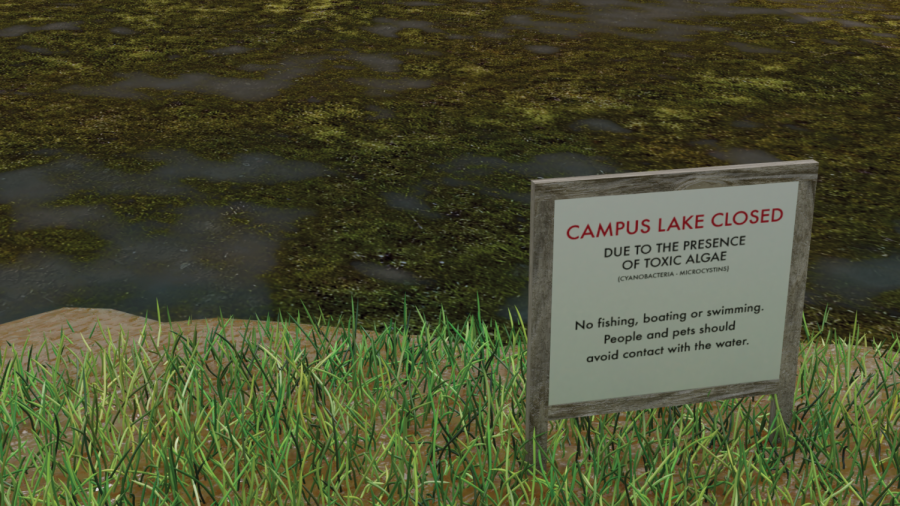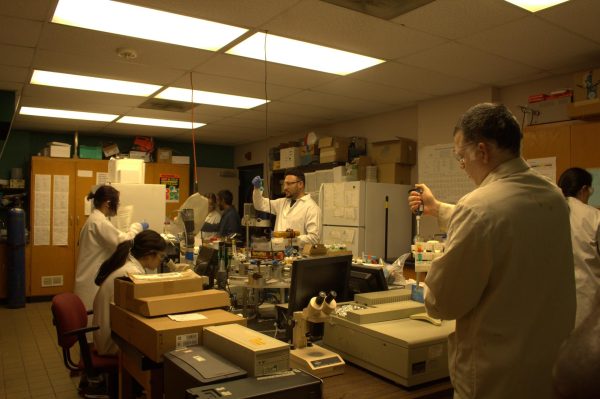A Historical Look at SIU: What’s in a Lake?
Campus Lake, touted as “one of the jewels” of Southern Illinois in university promotions, has been closed for seven years due to high toxicity levels, and continues to run up against obstacles to rehabilitation.
In 2019 the Daily Egyptian (DE) reported the lake was “expected to reopen” after passing numerous environmental health checks.
The optimism never turned into reality.
Advertisement
The COVID-19 pandemic derailed any significant re-opening plans, and by 2021 the lake has again closed after a report by the Illinois EPA recorded unsafe levels of toxins in the water.
Natural beauty often ranks highly in the promotional material of Southern Illinois University Carbondale (SIU). One of the campus’s most heavily photographed spots is the scenic landscape of Campus Lake. Yet as the lake finishes its seventh year of semi-continuous closure, the question remains whether SIU’s very own environmental enigma will ever be solved.
Purchased in 1956 from the same Thompson family that gave its name to Thompson Point and Thompson Woods, Campus Lake was originally known as Thompson Lake. It was only after its purchase that it would be re-christened, when a new Thompson Lake was created just north of Carbondale to serve as a local reservoir.
The lake is spring-fed, not man-made, though expanded and altered throughout the years, with the addition of a levy on its west side raising the water level. Its natural origins and long history would turn out to be both a blessing and a curse.
Ellee Fillmore, a graduate student in behavior analysis and therapy, has been present for many of the recent changes to the lake.
“When I first got here six years ago, the lake on campus did not look like it does today,” Fillmore said. “It was closed off so that you weren’t supposed to even walk around it. There were certain areas of it that were accessible, but you couldn’t go all the way 360 degrees around it.”
The 2016 lake closure Fillmore described was the second closing in recent memory for Campus Lake, the first occurring in 2014. Then, as now, dangerous algae and bacteria were blamed.
Advertisement*
An Oct. 13, 2014 article of the Daily Egyptian quoted then-Vice Chancellor for Administration and Finance Kevin Bame who said, “we are closing the boat house and temporarily banning fishing or boating on the lake. We urge people to keep their pets away from the water.”
The same article noted both Evergreen Reservoir and Piles Fork Creek were closed for similar reasons, before adding, “the University cannot predict how long the lake will be closed.”
Later DE and local news articles said the lake would remain closed in 2015, with the same warning signs that had been posted a year earlier being placed around the lake.
Despite the reportedly dangerous conditions, the “Polar Bear Plunge Club” was allowed to hold its Special Olympics fundraiser by performing their annual run into the freezing cold winter waters of the lake. The 2015 plunge involved community members and high school groups, and raised just over $55,000.
Uncertainty surrounding the lake’s closures, combined with the allowance of activities like the Polar Plunge and other misinformation about the algae blooms, would eventually feed into SIU’s constant student-led whirlwind of gossip and rumor.
“They [the SIU administration] said it was because of the bacteria in the water, that you weren’t supposed to touch it, and they had that orange plastic fencing around most of it,” Fillmore said. “A large rumor when I was in my undergrad was that it was one of those fraternity traditions to do some kind of hazing in the lake, and that somebody passed away. After learning some more about it, I figured out that wasn’t actually what happened.”
In 2004, SIU officials permanently banned the Pi Kappa Alpha fraternity from campus, citing a, “violation of eight charges stemming from the drowning of SIUC freshman Brent Johnson.”
The lake in question for this incident was Cedar Lake, a 1,750 acre reservoir just south of Carbondale.
The true reason for Campus Lake’s closure remained the algae blooms. In 2016, the University began an operation to fully dredge all 40+ acres of the lake in an attempt to clear out the algae, something not done since 1957 according to Bame.
An April 1, 2018 article in the Southern Illinoisian detailed the drainage activities, noting they involved several different colleges, departments and student projects in a variety of attempts to rehabilitate the lake.
In total, an estimated $450,000 was spent, and more than 24 thousand tons of debris was removed from the lake bed.
In addition to the biological matter and debris, more than 100 fishing rods, fifteen cell phones and several bicycles were removed.
A Feb. 28, 2018 article in the DE noted scientific testing of the lake bed revealed one last surprise: an, “unusually high presence of fecal matter.”
“It wasn’t until I got to campus that I noticed this awful smell on the first and second day of move-in,” Fillmore said about the 2016 draining. “It was completely drained. It was just mud.”
As the lake recovered from the draining, the University continued to invest in it. The Becker Pavillion boat dock, complete with canoes and paddle boats, would be added to the lake thanks to a generous donation from Ralph Becker, a 1955 SIU alum.
Students also assisted the recovery, with work from the Green Fund and various other college departments adding to the recovery activities.
“There are several things that you can do with the lake, but I don’t really like how much they talk about Campus Lake when you’re hearing about our school, and seeing pictures of it,” Fillmore said. “There’s really not a lot going on there.”
Though paddle boats and canoes are still occasionally allowed into the water, and the scenic Campus Lake Trail remains open, warning signs have stayed up and activities around the lake are still restrained.
“I would really like to see some more things being centered around that part of campus in future, because it is really pretty,” Fillmore said.
Consulting reporter Ryan Jurich can be reached at [email protected]. To stay up to date with all your Southern Illinois news, follow the Daily Egyptian on Facebook and Twitter.
Advertisement











